7 Secrets To Writing A Best Selling Book That Sold 2 Million Copies!
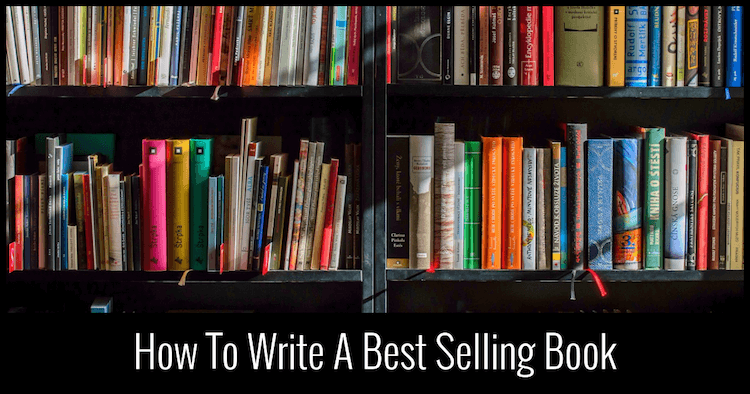
A book that will impact the lives of MILLIONS!
In this article best selling author Jerry Gillies reveals his own personal secrets on how to write a best selling book.
Jerry wrote the 2 Million selling best seller MONEYLOVE back in 1978 – in the days before the Internet and Amazon.
At a time when you could not fake your book into a “best seller”.
How I Raised Myself from Poverty to Prosperity With a Bestselling Book, plus 7 Secrets That Will Help You Do The Same
By Jerry GilliesI am not declaring that I am smarter, or even a better writer than you.
In fact, I’d be willing to bet you are in better financial shape right now than I was then.
Two things, however, that led to my success:
- An overwhelming belief that I had something valuable to say.
- The willingness to drop everything else in my life, including an income, and focus all my energy and attention on writing.
In fact, there are few single events in life that can produce the results in cash, widespread recognition, and building a legacy than having a book hit the NY Times bestseller list. Being able to call yourself a bestselling author is just as prestigious, though not nearly as difficult to attain, as being able to call yourself an Academy Award-winning actor, or Nobel Prize winner.
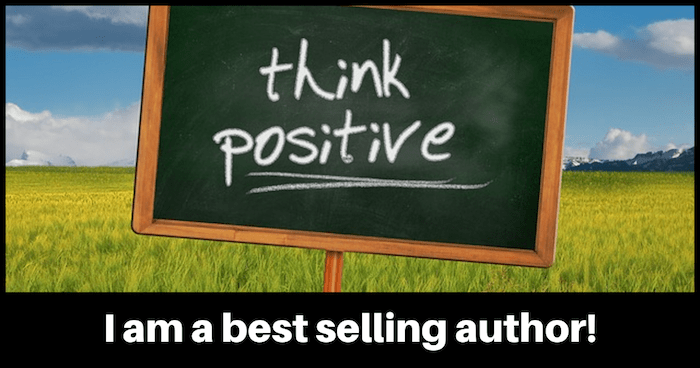
How To Write A Best Selling Book Secret #1:
The Company You Keep
Most of us have heard this or a variation of it ‘You are the average of the five people you spend the most time with.’Well before Moneylove, I wrote a book called FRIENDS–The Power and Potential of The Company You Keep.
In that book, I focused on the importance to a happy and successful life of having what I termed a “supportive interpersonal environment.”
Since all writers need encouragement and praise, it is vital that the people around you can provide these benefits. Particularly, you need to include writers in your circle of friends. And specifically, if possible, writers who are published and more successful than you.
This is a big one you don’t hear about too much. Instead, you hear about how writers are mostly loners and isolated, therefore not available to you for mentoring and support. This is basically a Big Lie.
It is true that a majority of writers keep to themselves a lot, otherwise they wouldn’t get much writing done. But I luckily stumbled upon the fact that there are bestselling authors hanging out at a lot of specific places, and they are very friendly and approachable at those places. The advantage of getting to know some bestselling authors is that you will discover we are ordinary folk, and you fit in very well when we get together.
A bestselling millionaire author would much rather hang out with a beginning writer earning minimum wage as a waiter (while writing his or her book) than a banking tycoon or multimillionaire builder.
Best Selling Writers – Where Are They? How Do You Reach Them?
When I was doing interviews at NBC Radio in New York, I got to talk to a number of bestselling writers, but it wasn’t until I joined and became active in the Association for Humanistic Psychology that I had the opportunity to be in the company of lots of them. One amazing thing I discovered was that I was treated with the same welcoming energy and respect before I had written my first book as I was when sales of Moneylove started approaching their first million copies. And the lectures and workshops at AHP conventions were fascinating and gave me a lot of material for future books.Next, I joined The National Speakers Association, thanks to Mark Victor Hansen, who invited me to my first NSA convention. Then, the Santa Barbara Writers Conference, where I got to know people like Ray Bradbury and Rita Mae Brown.
Finally, The Inside Edge, the famed leadership support group [Mastermind] that Jack Canfield, Louise Hay, Wayne Dyer, Norman Cousins, myself and Susan Jeffers helped found, and most of the board of advisors had written successful books.
There’s not enough room in this article to list all the advantages of hanging out with other authors.
A strategy you might explore is to get in touch with some successful authors and find out whether they attend any of the writers conferences or other professional associations, and, if so, whether they would be willing to meet with you for a chat.
Of course, if you have any bestselling authors in your city, you can contact them and ask for a personal interview. As a former newsman, I sometimes used this ploy and just asked a favorite author if I could interview them for a possible article or newsletter. Now we have blogs to serve that purpose. No matter how rich, famous, and busy a bestselling author is, they will rarely turn down a new writer who wants to spend a few minutes with them.
A perfect example of this comes from two of the bestselling authors in human history. They are also two longtime friends of mine, going back over thirty years, before they ever wrote or even thought of the first book in the bestselling series
of the 20th century, the Chicken Soup for The Soul series.
I first met Jack Canfield when I interviewed him for NBC. Mark Victor Hansen and I became friends after he wrote me a wonderful note telling me how much Moneylove had meant to him and had helped him become a prosperity teacher. They were both impressed with how successful Moneylove was.
The Chicken Soup for the Soul books, over 225 of them, which have sold half a billion copies in 47 languages, are collections of short true stories from teachers, workshop leaders, and ordinary people. Some of them are funny. Some are sad. But they all have an uplifting message. I’ve written five of the stories myself for three of the books over the years.
I think Jack and Mark would have been astonished, to know two things when we first talked about this first Chicken Soup book: One, how very very successful it would be, making them both millionaires many times over. Two, and maybe even a bigger surprise–they did not start out planning exactly this kind of book, of tales from mostly ordinary people out there.
Here’s a Chicken Soup for the Soul story, which I don’t think has ever been told anywhere before, but I was there.
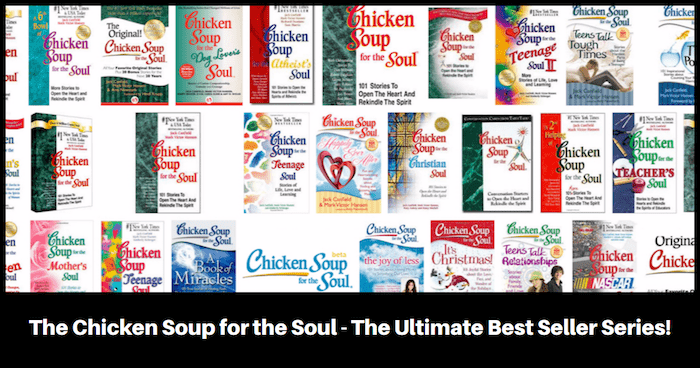
One of the great benefits of seeing all those great speakers in one place, seeing and hearing their best talks, one after the other over several days, was that we got to hear their best stories. Jack and Mark and I talked about the fact that every speaker had at least one killer story he or she told at the end of their talk.
It was either a funny or inspiring or poignantly moving story, sometimes all three.
I don’t know which of us thought of the idea first, but we began to discuss going to all these top speakers and collecting their killer stories for a book.
Jack and Mark took off with this idea as I got involved in other things, mostly traveling and doing workshops overseas. A problem came up that provides a valuable lesson for all authors.
That lesson is:
Since many of the most famous and successful speakers had just one powerful closing story they used for audiences all over, year after year, they were reluctant to allow them to be circulated more widely in a book. Also, some of them were the types of stories that had to be heard with an audience to be most effective. Their power and impact might be diminished by appearing in print.
So, Jack and Mark dramatically changed their focus. They realized that lots of people had great, moving, funny, inspiring stories. Stories from their own lives. And Chicken Soup for The Soul was born. They also deserve a lot of credit for their persistence and commitment (two more qualities any author needs), since that first Chicken Soup book was turned down by about 150 different publishers in the course of a year or so. Finally, the small Florida-based company, Health Communications, took it on. The rest is truly publishing history.
Some valuable lessons for all writers and potential bestselling authors in the experiences of Jack and Mark. But I think the most valuable one of all was that they were ready to turn on a dime when circumstances changed. They changed the criteria for the stories in the book itself, and they kept going when many another author would have given up after the first 10 or 50 or 100 rejections.
How To Write A Best Selling Book Secret #2:Any man who keeps working is not a failure. He may not be a great writer, but if he applies the old-fashioned virtues of hard, constant labor, he’ll eventually make some kind of career for himself as writer.
– Ray Bradbury
Happy Talk About What You Do
Many writers giving advice say an author shouldn’t talk about what he or she is writing. It’s true that talking too much to too many people about your forthcoming book, article, or blog post can suck the energy out of any creative project. I agree with that premise, but do want accentuate the positive truth that you should be talking about what you are doing in your own life. Especially the stuff you plan to include in your book.“You better make them care about what you think. It had better be quirky or perverse or thoughtful enough so that you hit some chord in them. Otherwise it doesn’t work. I mean we’ve all read pieces where we thought, ‘Oh, who gives a damn.’ ”
—Nora Ephron
My Own Happy Talk Experience
A lot of the success for me in writing and promoting Moneylove came from the fact that I was already talking about prosperity consciousness before I even pitched the book to a publisher. I had listened to some tapes of a man named Leonard Orr, who had an unusual concept. He said your attitudes about money itself dictated your financial results.This excited and stimulated my creativity and I went to one of his evening seminars. I started to come up with strategies of my own to put his ideas into action. I had been doing lectures and workshops on communication and relationships. Now I threw in little tidbits about prosperity consciousness, and how I was using it in my own life.
People got enthusiastic, got results, and asked for more and the rest is all about the momentum that energy generated.
I love the song Happy Talk in the musical, South Pacific. Especially the opening:
I would change the second line to: “Talk about things you do.” If you are passionate and excited about the subject of your book, or whatever you are writing, and have found the ideas are making a difference in your life, or the lives of anyone else, then talk about that–not the specifics of your actual book.Happy talk, keep talking happy talk,
Talk about things you’d like to do,
One great strategy to put this concept into practice is to prepare, before you even start writing your book, an actual thirty minute talk on the subject. This will also enable you to introduce your ideas and focus on the most important theme. You can even approach local organizations that book speakers about having you do your talk. Even if you do some free talks for charitable groups, churches and such, it’s a great marketing research tool.
This also helps with something all aspiring authors need to do. In today’s publishing world, an author needs to do a lot of the marketing and promotion himself. It is vital that you not only provide a great proposal or manuscript to a publisher, but also tell what audiences will buy the book and how you intend to reach them
How To Write A Best Selling Book Secret #3:
Start Immediately
One of the first pieces of prosperity advice I put in Moneylove was from pioneering psychologist William James. He said that in order to change your life, you had to start immediately. So, let us consider this: you are probably not a bestselling author right now, or you wouldn’t be reading this article. What you want to therefore change is to become a bestseller author, at least to begin that process. Start immediately. Start writing, even if you’re not sure what you want to say.“My advice is not to wait to be struck by an idea. If you’re a writer, you sit down and damn well decide to have an idea. That’s the way to get an idea.”
~ Andy Rooney
If you are serious, begin to write at least one page a day. It doesn’t have to have a purpose or specific goal, but you have to do it with energy and without exception. Julia Cameron says in, The Artist’s Way, that you should wake up every morning and immediately write three pages. Some folks might find that too daunting. Do it if you can, but at the very least–one page. Once you have done this for a month, check out your first pages versus your latest pages and you will find the practice has made a difference. This will change your results whether you are wanting to write a book, a blog, persuasive emails, or clever Tweets.
Here are several starting immediately strategies I’ve given in my Writing A Bestseller workshops along with personal coaching clients:
Write a simple and clear sentence that explains what your book is about.
If you have such a clear command of your purpose in writing a book (or anything) that you can convey its essence in a single sentence, you are starting out way ahead of most authors.
Write the copy for your book’s jacket.
For the research necessary to do this, you will have to go to the library or a bookstore and check out the jacket copy on hardcover books, particularly the side flaps. Writing your own version of this for your own book can provide momentum, even if what you write now won’t accurately describe your finished manuscript.
Start doing what I call Sampling Your Future Success.
I did this by cutting out a copy of the NY Times bestseller list, and typing Moneylove on the list before putting it on my bulletin board.
In addition to a proposal or manuscript, you need to have a clear idea of who your audience is and how they can be reached If you have a blog with thousands of hits, that’s an easy one.
I also always visualize myself appearing on a major talk show and imagine what questions the host (I use Oprah a lot, since I actually was a guest on her show) will ask, and how I would respond.
How To Write A Best Selling Book Secret #4:
Capture the readers attention with your opening lines
One way to always guarantee you will intrigue, attract, interest, and capture the attention of a reader is to become a master of the opening line, or even the opening several lines.Even before you fully write your book (or even a blog post) getting the opening clarified and clear in your head is essential.
I don’t know about you, but when I am browsing through books in a bookstore, the library, or online, I always check out the beginning sentences. The first words either trigger a desire in me to read more, or they don’t. In Moneylove, my opening lines in the Introduction were:
“You deserve to be rich, and you can be rich. MONEYLOVE can help you have a life of abundance, filled with love and creativity and, incidentally, all the cash you want.”I call this, beginning the begin!

Widely considered the best opening line in literature is Jane Austen’s for Pride and Prejudice:
“It is a truth universally acknowledged, that a single man in possession of a good fortune, must be in want of a wife.”This sentence lets the reader know what kind of a book he or she has chosen. It sets a tone.
And here’s a shocking truth about being a bestselling author: you can learn as much or more about good writing from reading really great opening lines from books, as you can from almost any college course on writing. And this is the best time in history to do this, because you can find those openings online without having to go to a library or bookstore. If you put into your search engine a request such as “great opening lines in books,” or: “the best literary opening lines,” you will gain access to an unlimited stream of the best ones out there.
In nonfiction, look at the opening line of the foreword to Napoleon Hill’s Think and Grow Rich:
How To Write A Best Selling Book Secret #5:“The Thirteen Steps to Riches described in this book offer the shortest dependable philosophy of individual achievement ever presented for the benefit of the man or woman who is searching for a definite goal,”
The Short and Sweet of It
Not that the story need be long, but it will take a long while to make it short.
– Henry David Thoreau
Short words and short sentences are pretty much norm now in most
writing courses, but when I first started talking about this in the
1970s, the standard was flowery language and complex sentences, except
for a few brilliant writers who knew this secret. That it is no longer a
secret is pretty much due to one man, Rudolf Flesch (see Secret Seven
below for more on him).– Henry David Thoreau
As you can see by my opening for this article, I do not always follow the popular advice to keep sentences short. Sometimes long is more expressive. Sometimes a few long sentences interspersed with a lot of short ones can create a pleasing rhythm. Back and forth. A master of this quality in her writing is Harper Lee. Her opening for, To Kill a Mockingbird, is a brilliant example of mixing short sentences and long flowing ones. She didn’t go for flash or shock, but simply started with the kind of statement a child might make,
“When he was nearly thirteen, my brother Jem got his arm badly broken at the elbow.”
Look at how simply Harper Lee conveys the life of a sleepy old Southern town in very few words. “There was no hurry, for there was nowhere to go, nothing to buy and nothing to buy it with.”
To Kill a Mocking Bird, one of my very favorite books, is the epitomé of clear and simple writing. As the best books in fiction or nonfiction always do, an author should create a dialogue with the reader that resembles a good friend telling a good story.
In terms of cutting down on wordage, I have had any number of successful nonfiction and fiction writers tell me that one of the most important disciplines any writer can master is to take a paragraph or sentence, or even a page, that you really are in love with, and cut it from your manuscript.
I had a whole chapter left out of Moneylove when I got the final galleys prior to it going to the printing presses. The book originally had seven chapters, and my editor, Herb Katz, without telling me, cut a whole chapter out because he felt it didn’t fit with the other chapters. After a while, I was forced to agree with him, but not until I had ranted and raved for a week or two.
Writing can be like music. There are high notes. There are low notes. And once in a while, there are no notes, as you pause to let the mind breathe between paragraphs.
A Warning Note:
If most of the writing you have done has been of an academic sort while taking college courses, you will be at a disadvantage in writing for a larger mainstream audience. Most readers today are most comfortable with a 5th grade level of vocabulary, and anything more may go right over their heads.How To Write A Best Selling Book Secret #6:
Become a One Trick Pony
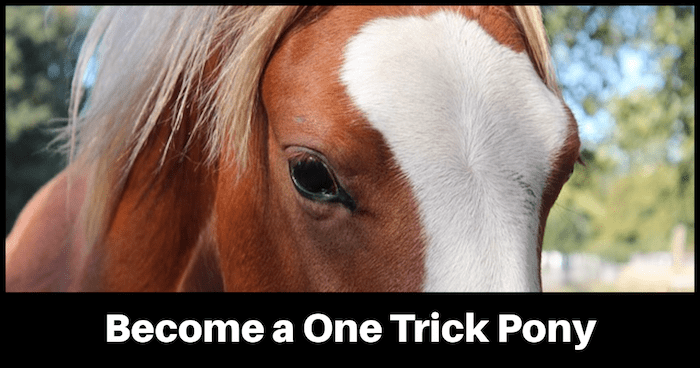
One of the bestselling authors I had some impact on was Spencer Johnson. Spencer has been kind enough to tell me my two hour seminar on writing a bestseller at the National Speakers Association really made a difference in his approach to writing. What he was doing with corporate clients was teaching them the value of praising employees, in a very short amount of time. This one minute praise technique led to the huge bestseller he wrote with management expert Kenneth Blanchard, The One-Minute Manager, which has sold over thirteen million copies. Spencer Johnson went on to write the bestselling, Who Moved My Cheese, as well as the ValueTales series of children’s books.
Spencer Johnson is obviously a very creative writer who has lots of ideas for books, but his first effort was so successful because rather than just come up with a book he thought would sell, he focused on what he was already doing. And once he became a master of that one idea, he and his co-author, Ken Blanchard, came up with the add-ons of One Minute Goals and One Minute Reprimands. They thus became three-trick ponies and much more.
Louise Hay is another multi-million copy bestselling author who started out with one trick, which led to You Can Heal Your Life — over 50 million sold and counting.
I remember back in the early 1980s, Louise, her assistant, Julie, and I sitting in a hot tub in the backyard of her rented house in Santa Monica. She had produced a cult classic, You Can Heal Your Body. A small booklet, it was beloved by the holistic health community. But Louise had delayed turning this material into a full-length book, even though she had a publishing contract to do so. A lot of our conversation focused on trying to motivate Louise to finish the book. I can assure you that, at that moment, Louise did not have a clue, or even a dream, about being a bestselling author. And she certainly could not have foreseen that she would create a large publishing empire (Hay House) and influence and help millions of people around the world. And it all grew out of her original idea that certain emotions trigger certain illnesses and symptoms. For a one trick pony, Louise Hay certainly picked the right trick.
We were friends, so I wouldn’t have even thought about charging her for the coaching I did in and out of that hot tub. I earned a lot more money than any coaching fees would have produced, however, as she mentions Moneylove very favorably in You Can Heal Your Life. This led to thousands of sales for me.
Often, when you want to be focusing on an upcoming book project, no matter how multi-dimensional you are–no matter how many tricks you have up your sleeve–it is best to focus on a single strong subject or theme. For an aspiring bestselling author, multitasking can be a mental vampire, sucking the energy out of the big idea you have.
How To Write A Best Selling Book Secret #7:
Bookworm Your Way to Success
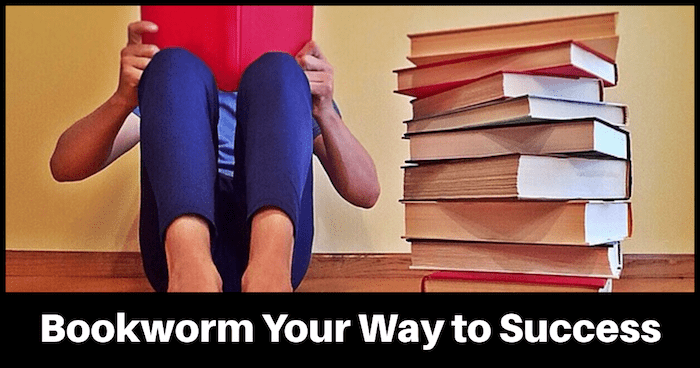
Ask any successful author…
“If you stuff yourself full of poems, essays, plays, stories, novels, films, comic strips, magazines, you automatically explode every morning like Old Faithful. I have never had a dry spell in my life, mainly because I feed myself well, to the point of bursting. I wake early and hear my morning voices leaping around in my head like jumping beans. I get out of bed quickly, to trap them before they escape.”I don’t know any good and successful writers who don’t surround themselves with books, both fiction and nonfiction.
—Ray Bradbury
“If you want to be a writer, you must do two things above all others: read a lot and write a lot.” Stephen King
“I never desire to converse with a man who has written more than he has read.”
Samuel Johnson
I have long asserted that fiction is important to read, especially for those who have limited themselves to nonfiction. I have had a number of professional speakers and motivational teachers say they only read nonfiction because that’s information they need for their careers. Wrong!
Fiction is important because novelists are some of the great thinkers and philosophers about the human condition. I have learned more about life and people from novels than from any nonfiction books on the subject. There are parts of the brain that are stimulated and enriched by reading fiction that no other method seems to duplicate.
I also have never met a successful author who didn’t have a few favorite books on writing.
So, here are my seven favorites on being a better writer:
1. The Elements of Style…by Strunk and White. This is the classic on writing style that almost every writer of note has a copy of. It is an enduring masterpiece whether you are writing a nonfiction book, a novel, an article or blog post.
2. The Artist’s Way…by Julia Cameron. A book not just about writing but an instruction manual on training your mind to be more creatively productive.
3. On Writing Well—by William Zinsser –This addresses directly the problem most beginning writers have with too many words, sentences and paragraphs that are just too long. And Zinsser demonstrates how it should be done by his own crisp,clear, simple writing style.
4. The Art of Readable Writing—by Rudolf Flesch. You might as well start with this classic from 1949, though almost any of Flesch’s books on speaking and writing plainly and clearly are well worth reading. This was the very first book I read on writing, as a high school student. It may just be the single book that most influenced my writing style. Flesch was also the author of the iconic bestseller, Why Johnny Can’t Read.
5. Bird by Bird—by Anne Lamott. One of the most outrageous and down-to-earth and funny books you’ll find on the subject of writing. She is one of my very favorite writers, and unusual in that she has had bestsellers both on the fiction and nonfiction lists.
6. Zen in the Art of Writing – by Ray Bradbury. The late genius created this collection of essays on writing and creativity. A lot of the material was introduced during his annual opening night lecture at the Santa Barbara Writers Conference, where we were both on the faculty. I was proud to be his friend and for him to be my generous mentor. Those of you familiar with my Moneylove philosophy will understand why I love this book. While many writers talk and write about how difficult and lonely writing is, Ray thought writing was more fun than anything else. He said, “If you are writing without zest, without gusto, without love, without fun, you are only half a writer.”
7. Starting from Scratch: A Different Kind of Writer’s Manual – by Rita Mae Brown. While still in her twenties, she wrote Rubyfruit Jungle, a novel about growing up as a lesbian in the South. Rita Mae is also one of my all-time favorite authors, and listening to her erudite lectures at the Santa Barbara Writers Conference was a delight and powerful learning experience.
You may choose your own favorite books about writing, there certainly are hundreds, perhaps thousands, to select from, and maybe a friend or teacher or writer you know has recommended one or more. For me, these seven books contain the essential information I want and need to practice my craft, though I have read and collected many others over the years.
How To Write A Best Selling Book – Bonus:
It always astonishes me how many writers don’t know what a tremendous resource the magazine, Publishers Weekly, can be. It’s the trade publication for the publishing industry and aimed at publishers, editors, bookstores, and literary agents. If you are serious about writing a bestseller, it is a must-read. Or I should say it’s a must-browse. With hundreds of pages every week, actually reading the whole thing would be overwhelming.Publishers Weekly will help you keep up with what books are coming out, which authors just got a big advance, how social media is promoting book sales, and whether an editor you were thinking of sending your book proposal to has just left and gone to another publishing house. For me, however, the best part of PW is the review section, with nonfiction as a separate category. In those mini-reviews, you will find books you wouldn’t know about otherwise, books that aren’t to be found in your local bookstore or library. I’ve lost count of how many books I’ve ordered after first reading about them in Publishers Weekly.
It is more than worth your while to check out this little-known publication (among the public, including writers). Your local library probably has a copy, and most bookstores do. You can therefore check it out at no cost.
I cannot imagine any writer who follows all seven secrets will have any difficulty in creating at least one huge bestseller. Go forth and prove me right!
About Jerry Gillies

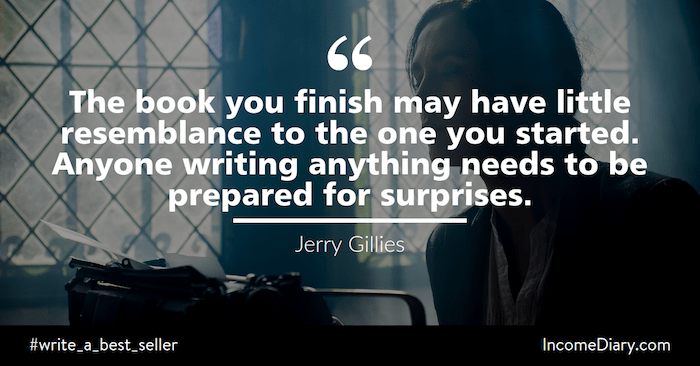
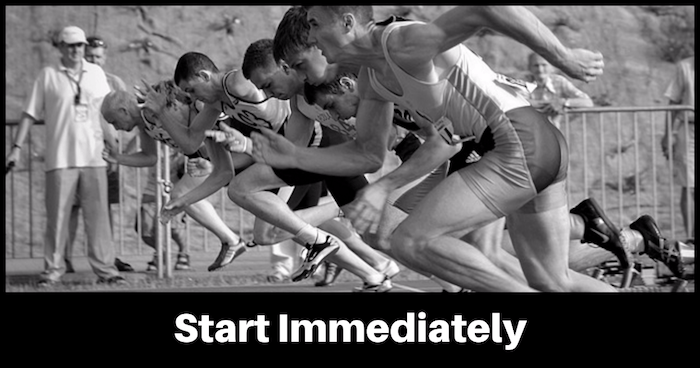












No comments
Post a Comment